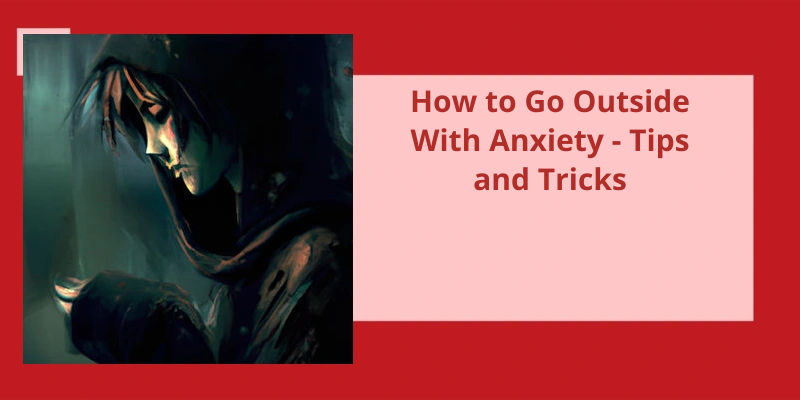Many people experience anxiety when facing the prospect of leaving their homes and venturing outside, often leading to debilitating agoraphobia. While this condition can be challenging to overcome, there are several practical strategies that can help reduce anxiety and make the prospect of leaving the house seem less daunting. One of the most essential skills is learning to control your breathing to calm your body and mind. It’s also helpful to increase awareness and challenge negative thoughts and perceptions. Having a supportive friend or family member by your side can provide a sense of safety and security, while visualizing positive outcomes can help you develop a more positive mindset. Remember to set achievable goals and take things slowly, and seek professional help if necessary. With perseverance and support, it’s possible to manage anxiety and enjoy life outside of the home.
What Are the 5 Techniques Used for Coping With Anxiety?
Anxiety can be a daunting and overwhelming experience for many individuals. It can feel debilitating and leave you feeling paralyzed, unable to perform daily tasks and make important decisions. However, it’s important to remember that there are techniques that can be used to effectively cope with anxiety. One effective technique is to question your thought pattern. When you experience anxiety, negative thoughts can take root in your mind and distort the severity of the situation. By questioning these thoughts, you can bring a sense of balance and rationality to the situation.
Deep breathing encourages your body to relax and can help reduce the physical symptoms of anxiety, such as a racing heart and shallow breathing. Taking slow, deep breaths can also help you to feel more centered and grounded.
Aromatherapy is another effective technique that can be used to cope with anxiety. Certain scents, such as lavender or chamomile, can have a calming effect on the body and mind. This can help relieve feelings of anxiety and promote relaxation.
Going for a walk or doing 15 minutes of yoga can also be effective techniques to cope with anxiety. Both activities encourage physical movement, which can release tension and stress from the body. Additionally, yoga can help you to become more aware of your body and the present moment, offering a sense of calm and peace.
Finally, writing down your thoughts can be an effective technique to cope with anxiety. When we write down our thoughts, we’re able to see them more clearly and objectively. This can help us to gain a new perspective on the situation and potentially alleviate some of our anxiety. Additionally, writing can be a cathartic and empowering experience, allowing us to process our emotions and gain clarity.
Cognitive Behavioral Therapy (CBT) as a Technique for Coping With Anxiety
- Identify negative thought patterns
- Challenge and reframe negative thoughts
- Learn relaxation techniques like deep breathing and muscle relaxation
- Gradual exposure to triggers
- Cognitive restructuring through the use of thought records
- Identifying and modifying maladaptive behaviors
- Setting achievable goals
Anxiety can be a challenging condition to manage, but there are coping skills and strategies that can help alleviate the symptoms. In addition to the tips mentioned above, there are many other things one can do to reduce anxiety and take control of their mental health. Here are five additional coping skills for anxiety that you can explore.
What Are 5 Coping Skills for Anxiety?
Anxiety is a common and often overwhelming emotion experienced by many individuals. Living with anxiety can be challenging, and it’s important to have coping mechanisms to help deal with the stress that often accompanies it. Managing anxiety can be achieved through several approaches, which may involve lifestyle changes, including regular exercise, healthy eating, and stress management techniques. These strategies can help reduce anxious thoughts, and ultimately promote a more positive and balanced mental health.
One of the best ways to cope with anxiety is to stay physically active. Engaging in moderate exercise on a regular basis stimulates the production of endorphins, which are natural mood boosters that can help to reduce feelings of anxiety. This can involve going for a walk, taking up a sport or exercise, or even simply engaging in relaxing activities such as yoga or meditation. Exercise provides an outlet for the emotional and physical tension that can arise from anxiety, preventing it from becoming overwhelming.
Avoiding drugs and alcohol is another effective coping mechanism for individuals struggling with anxiety. It’s important to understand that drug and alcohol abuse can worsen anxiety symptoms as they facilitate temporary relief and are often used as a form of self-medication. Therefore, quitting these substances can be vital to reducing anxiety levels and improving overall mental and physical health.
Reducing the consumption of caffeine or quitting it altogether can help reduce anxious thoughts, as it acts as a stimulant and can provoke anxiety symptoms. Caffeine is commonly found in coffee, tea, and soda, but is also present in energy drinks, chocolate, and some medications. Keeping track of caffeine intake can help minimize it’s impact on a persons anxiety level.
Relaxation techniques can range from breathing exercises, mindfulness, aromatherapy, acupressure, and more. These techniques are designed to alleviate anxiety symptoms by calming the body and reducing stress. Regular practice of relaxation techniques can help cultivate a more resilient and stable emotional state while reducing unpleasant symptoms of anxiety.
Sleep is a crucial aspect of managing anxiety, and it’s importance can’t be overstated. Regular and sufficient sleep reduces stress and improves mood while providing the body with the rest that it needs to function properly. Practicing good sleep hygiene can be extremely helpful in curbing anxious thoughts and promoting better mental health. This includes creating a bedtime routine, limiting electronic device use before bed, and creating a comfortable sleeping environment. Remember, adequate sleep can play a critical role in reducing anxiety levels and improving overall mood and health.
Cognitive Behavioral Therapy (CBT) as a Coping Skill for Anxiety
- Identify and challenge negative thought patterns that contribute to anxiety
- Practice relaxation techniques, such as deep breathing and progressive muscle relaxation
- Set achievable goals and work towards them gradually to increase confidence and reduce anxiety
- Exposure therapy, gradually confronting feared situations or thoughts to reduce anxiety over time
- Cognitive restructuring, replacing negative thoughts with more positive and rational ones
- Social skills training, improving communication and assertiveness to reduce anxiety in social situations
- Mindfulness meditation, paying attention to the present moment without judgment or distraction
- Problem-solving strategies, such as breaking down tasks into smaller steps and brainstorming solutions
It’s common for individuals with anxiety to feel overwhelmed by their thoughts and emotions, but coping mechanisms can provide relief in managing those feelings. As a therapist, you can introduce clients to various coping strategies that can aid in managing their anxiety. These methods, such as deep breathing, progressive muscle relaxation, and imagery, have been proven effective. By consistently practicing these techniques, clients will be better equipped to handle anxiety when it arises and ultimately contribute to long-term relief.
What Are Coping Mechanisms for Anxiety From a Therapist?
Anxiety is one of the most common mental health concerns that people face today. Many people struggle with feelings of anxiety, panic, and fear, which can interfere with their daily lives and prevent them from enjoying their relationships, work, and hobbies. Coping mechanisms for anxiety from a therapist are essential to helping people learn how to manage their symptoms and improve their overall well-being.
One of the most effective coping mechanisms for anxiety is deep breathing. This is a simple technique that involves taking deep, slow breaths, holding them briefly, and then slowly releasing them. This practice helps to slow down heart rate and blood pressure, which can reduce feelings of anxiety and stress. Deep breathing can be done anywhere, at any time, and doesn’t require any special equipment or training.
Progressive muscle relaxation is another coping mechanism for anxiety that can be taught by therapists. This technique involves tensing and relaxing each muscle group in the body, one by one. This helps people become aware of the physical sensations of stress and learn to release tension in their muscles.
Imagery is another powerful coping strategy that can be used to manage anxiety. This technique involves visualization or imagining a calming, peaceful scenario or experience. For example, someone may imagine lying on a beach or walking through a forest. By focusing on these pleasant images, clients can relax their bodies and minds and reduce their levels of anxiety.
Challenging irrational thoughts is often a crucial component of cognitive-behavioral therapy, which is commonly used by therapists to treat anxiety. Many people with anxiety experience negative or irrational thoughts that can fuel their anxiety and make it difficult to cope with. By learning to identify and challenge these thoughts, clients can learn to reframe their thinking in more positive ways and reduce their levels of anxiety.
Strategies like deep breathing, progressive muscle relaxation, imagery, and challenging irrational thoughts can all be effective for managing anxiety and preventing it from interfering with daily life. With the help of a trained therapist, clients can learn to implement coping strategies that work for them and improve their overall well-being.
Living with agoraphobia can be incredibly challenging and affects many different parts of a person’s life. The fear and anxiety associated with leaving the house can result in missed opportunities for social interaction, work, and experiences. If you’re struggling with agoraphobia, it’s important to know that you aren’t alone, and there are treatments available to help you manage your symptoms and improve your quality of life.
Why Do I Get Anxiety Every Time I Go Outside?
Agoraphobia can be a debilitating condition that severely limits a persons ability to function in everyday life. It can cause intense fear, panic attacks, and physical symptoms such as rapid heartbeat, sweating, and trembling. The fear of leaving the safety of ones home can be overwhelming, and many people with agoraphobia feel trapped and isolated.
The exact causes of agoraphobia aren’t fully understood, but research suggests that it may be linked to a combination of genetic, biological, and environmental factors. Traumatic life events, such as accidents or assaults, can trigger agoraphobia in some people. Other risk factors include a history of anxiety disorders or other mental health conditions, substance abuse, and chronic stress.
Treatment for agoraphobia typically involves a combination of medication and psychotherapy. Medications such as antidepressants and anti-anxiety drugs can help reduce the symptoms of anxiety, while psychotherapy can help a person learn coping skills and techniques for managing their fear. Exposure therapy, a type of psychotherapy that involves gradually exposing a person to their feared situations, is often used to help people overcome agoraphobia.
Living with agoraphobia can be challenging, but it’s possible to manage the symptoms and improve ones quality of life with the right support and treatment. It’s important to seek help from a mental health professional if you’re experiencing anxiety or fear related to leaving your home, as early intervention can lead to better outcomes. With patience, persistence, and a willingness to confront your fears, you can overcome agoraphobia and regain your confidence and independence.
The Relationship Between Agoraphobia and Other Anxiety Disorders
Agoraphobia is often comorbid, or occurs alongside, other anxiety disorders such as panic disorder, social anxiety disorder, and generalized anxiety disorder. People with agoraphobia may experience anxiety or panic attacks in situations where they feel trapped, out of control or ashamed. This can lead to avoidance behaviors, making it difficult to go outside or leave the house. Addressing agoraphobia often involves addressing the underlying anxiety disorder through therapy, medication, or a combination of both.
Conclusion
In conclusion, going outside with anxiety may seem intimidating, but it isn’t impossible. By practicing breathing techniques and increasing your awareness, you can manage the uncomfortable symptoms of anxiety. Bringing a friend along, visualizing positive outcomes, and seeking help with agoraphobia can also make a significant difference. Remember to take it slow and set achievable goals to gradually overcome your anxiety and enjoy the outdoors. With patience, perseverance, and the right strategies, you can conquer your anxiety and venture out into the world with confidence.






